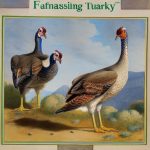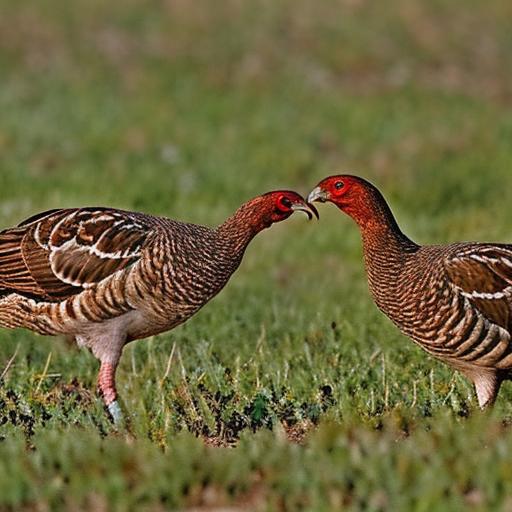Turkey genetics is a crucial aspect of the turkey industry, as it directly impacts the quality and productivity of turkey production. The genetic makeup of turkeys determines their growth rate, meat quality, disease resistance, and overall performance. Selective breeding has been used for centuries to improve the genetic traits of turkeys, and today, it plays a vital role in meeting the demands of the modern turkey industry. Turkey genetics is a complex field that requires a deep understanding of genetics, breeding techniques, and the specific traits that are desirable for commercial turkey production. As the demand for high-quality turkey products continues to grow, the importance of turkey genetics and the selection of hens for breeding purposes becomes increasingly significant.
Key Takeaways
- Turkey genetics play a crucial role in the breeding and production of high-quality turkeys.
- Selecting hens for breeding is important for maintaining and improving the genetic traits of turkeys.
- Criteria for selecting hens for breeding include traits such as growth rate, feed efficiency, and disease resistance.
- Turkey geneticists play a key role in evaluating and selecting hens for breeding based on genetic potential and performance.
- Challenges in selecting hens for breeding include genetic diversity, disease resistance, and market demands, but the future of turkey breeding and genetics looks promising with advancements in technology and research.
The Importance of Selecting Hens for Breeding
Selecting hens for breeding is a critical process that directly impacts the genetic improvement of turkey flocks. The genetic potential of a turkey flock is largely determined by the quality of the hens that are selected for breeding. High-quality hens possess desirable traits such as fast growth, efficient feed conversion, disease resistance, and superior meat quality. By carefully selecting hens with these desirable traits, turkey breeders can improve the overall performance and productivity of their flocks. Additionally, selecting hens for breeding allows breeders to maintain genetic diversity within their flocks, which is essential for preventing inbreeding and maintaining the overall health and vigor of the turkey population. Ultimately, the selection of hens for breeding is a fundamental aspect of turkey genetics that directly impacts the success and sustainability of the turkey industry.
Criteria for Selecting Hens for Breeding Purposes
When selecting hens for breeding purposes, turkey geneticists consider a wide range of criteria to ensure that the selected hens possess the desired genetic traits. One of the most important criteria is growth rate, as fast growth is essential for efficient meat production. Hens with a fast growth rate are able to reach market weight more quickly, which is economically advantageous for turkey producers. Another crucial criterion is feed conversion efficiency, as hens that can convert feed into body weight more efficiently are more cost-effective to raise. Disease resistance is also a key consideration, as hens that are resistant to common turkey diseases can help reduce the need for antibiotics and other medical interventions. Additionally, meat quality traits such as breast size, meat yield, and tenderness are important criteria for selecting hens for breeding purposes. By carefully evaluating these and other criteria, turkey geneticists can identify hens with the most desirable genetic traits for breeding purposes.
In addition to physical traits, behavioral characteristics are also important criteria for selecting hens for breeding. Hens that exhibit good maternal instincts, such as strong nesting behavior and protective instincts, are desirable for maintaining healthy and productive turkey flocks. Furthermore, egg production and hatchability are critical criteria for selecting hens for breeding purposes. Hens that lay a high number of eggs with good hatchability contribute to the overall reproductive success of the flock. Finally, genetic diversity is an essential criterion for selecting hens for breeding purposes. Maintaining genetic diversity within turkey flocks helps prevent inbreeding and preserves the overall health and vigor of the population. By carefully considering these criteria, turkey geneticists can select hens with the most desirable genetic traits to improve the overall performance and productivity of turkey flocks.
The Role of a Turkey Geneticist in Selecting Hens
Turkey geneticists play a crucial role in selecting hens for breeding purposes by applying their expertise in genetics and breeding techniques to identify hens with the most desirable genetic traits. They work closely with turkey breeders to develop breeding programs that aim to improve specific traits such as growth rate, feed conversion efficiency, disease resistance, and meat quality. Turkey geneticists use advanced genetic tools and technologies to evaluate the genetic potential of individual hens and identify those with the most desirable traits for breeding purposes. They also conduct extensive research to understand the genetic basis of important traits and develop strategies to improve these traits through selective breeding.
In addition to identifying hens with desirable genetic traits, turkey geneticists also play a key role in maintaining genetic diversity within turkey flocks. They carefully monitor the genetic composition of turkey populations and develop strategies to prevent inbreeding and preserve genetic diversity. By working closely with breeders and utilizing their expertise in genetics and breeding techniques, turkey geneticists contribute to the overall genetic improvement of turkey flocks and help ensure the long-term sustainability of the turkey industry.
Challenges and Considerations in Selecting Hens for Breeding
Selecting hens for breeding purposes presents several challenges and considerations that must be carefully addressed to ensure the success of breeding programs. One of the main challenges is balancing multiple desirable traits, as some traits may be negatively correlated with each other. For example, selecting for fast growth may result in decreased feed conversion efficiency, so it is essential to carefully evaluate and prioritize which traits are most important for a specific breeding program. Additionally, geneticists must consider the potential trade-offs between different traits and develop strategies to optimize the overall genetic potential of turkey flocks.
Another consideration in selecting hens for breeding is the potential impact of environmental factors on genetic traits. Environmental conditions such as temperature, humidity, and diet can influence the expression of genetic traits in turkeys. Therefore, it is important for geneticists to consider how environmental factors may interact with genetic traits when selecting hens for breeding purposes. By carefully evaluating these challenges and considerations, turkey geneticists can develop effective breeding programs that maximize the genetic potential of turkey flocks while addressing potential trade-offs and environmental influences.
The Future of Turkey Breeding and Genetics

The future of turkey breeding and genetics holds great promise as advancements in genetic tools and technologies continue to revolutionize the field. With the development of advanced genomic tools, such as DNA sequencing and marker-assisted selection, turkey geneticists will have unprecedented opportunities to identify and select hens with specific genetic traits more accurately and efficiently. These advancements will enable breeders to accelerate the genetic improvement of turkey flocks and develop new lines with enhanced performance and productivity.
Furthermore, as consumer demand for sustainable and ethically produced food continues to grow, there will be increasing emphasis on selecting hens with traits that contribute to sustainable turkey production. This may include selecting hens with improved feed efficiency, disease resistance, and environmental adaptability to reduce the environmental impact of turkey production. Additionally, there will be greater focus on selecting hens with superior meat quality traits to meet consumer preferences for high-quality turkey products.
Overall, the future of turkey breeding and genetics holds great potential for advancing the genetic improvement of turkey flocks and meeting the evolving demands of the turkey industry.
The Impact of Selecting Hens for Breeding on the Turkey Industry
In conclusion, selecting hens for breeding purposes plays a crucial role in improving the genetic potential of turkey flocks and ensuring the success and sustainability of the turkey industry. By carefully evaluating a wide range of criteria such as growth rate, feed conversion efficiency, disease resistance, meat quality, behavioral characteristics, egg production, hatchability, and genetic diversity, turkey geneticists can identify hens with the most desirable genetic traits for breeding purposes. Through their expertise in genetics and breeding techniques, they contribute to the overall genetic improvement of turkey flocks and help meet the demands of the modern turkey industry.
As advancements in genetic tools and technologies continue to revolutionize the field, there will be unprecedented opportunities to accelerate the genetic improvement of turkey flocks and develop new lines with enhanced performance and productivity. Additionally, there will be increasing emphasis on selecting hens with traits that contribute to sustainable turkey production and meet consumer preferences for high-quality turkey products. Ultimately, selecting hens for breeding purposes will continue to have a profound impact on the success and sustainability of the turkey industry as it evolves to meet the demands of a changing world.
As a turkey geneticist, selecting the right hens for breeding purposes is crucial. In a recent article on PoultryWizard.com, “The Chicken Coop Country Diner,” the importance of choosing the right hens for breeding is discussed in detail. The article provides valuable insights into the traits and characteristics that a turkey geneticist should consider when selecting hens for breeding purposes. For more information on this topic, you can read the full article here.
FAQs
What is the role of a turkey geneticist in selecting hens for breeding purposes?
A turkey geneticist plays a crucial role in selecting hens for breeding purposes by identifying and breeding turkeys with desirable genetic traits such as disease resistance, growth rate, and meat quality.
What are some of the desirable genetic traits that a turkey geneticist may look for in hens?
Desirable genetic traits that a turkey geneticist may look for in hens include high meat yield, efficient feed conversion, good egg production, and resistance to common turkey diseases.
How does a turkey geneticist go about selecting hens for breeding purposes?
A turkey geneticist selects hens for breeding purposes by conducting thorough genetic evaluations, analyzing pedigree information, and using advanced breeding techniques such as artificial insemination to ensure the propagation of desirable genetic traits.
What are the potential benefits of selecting hens with desirable genetic traits for breeding purposes?
Selecting hens with desirable genetic traits for breeding purposes can lead to improved turkey populations with higher meat and egg production, better disease resistance, and overall improved performance, ultimately benefiting the turkey industry and consumers.
Meet Walter, the feathered-friend fanatic of Florida! Nestled in the sunshine state, Walter struts through life with his feathered companions, clucking his way to happiness. With a coop that’s fancier than a five-star hotel, he’s the Don Juan of the chicken world. When he’s not teaching his hens to do the cha-cha, you’ll find him in a heated debate with his prized rooster, Sir Clucks-a-Lot. Walter’s poultry passion is no yolk; he’s the sunny-side-up guy you never knew you needed in your flock of friends!







